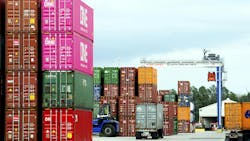The October ruling that tariffs on truck and bus tires from Thailand would be significantly higher than initially proposed was one market surprise.
But the case paperwork also reveals that Bridgestone Corp. must retroactively pay tariffs on Thai shipments that date back to February.
The U.S. Department of Commerce (DOC) says it was “unable to verify the accuracy of Bridgestone’s reporting with respect to its sales data, (and) as a consequence, we find that Bridgestone’s reported sales data are unverified and, thus, cannot serve as a reliable basis for calculating an accurate margin” for the tiremaker in this investigation.
Typically, the agency would use the tiremaker’s data to determine how much of a tariff to levy. But, despite months of back-and-forth between the DOC and Bridgestone in filings, as well as the tire manufacturer’s efforts to explain its numbers, the agency ultimately relied on what it calls “facts available with an adverse inference” to calculate a rate for Bridgestone.
The DOC has a few established options for how to choose that rate in instances like this and says in this case it has based its rate off the original dumping margin that the United Steelworkers (USW) alleged in its petition asking that tariffs be implemented.
Bridgestone’s 48.39% rate is four times higher than the rate of any other tiremaker or importer who brings truck and bus tires from Thailand into the U.S. Other companies will pay 12.33%.
In addition to the higher rate, Bridgestone is being penalized because the DOC must use other data to measure the flow of the company’s imports throughout the period of investigation. That data indicates “there was a massive increase in the volume of imports of the subject merchandise from Bridgestone during the critical circumstances period. Therefore, we are finding that critical circumstances exist with respect to imports of truck and bus tires from Thailand from Bridgestone.”
The phrase “critical circumstances” is an important trigger in these investigations. When that phrase is used, it indicates that the DOC will retroactively apply the tariffs.
In this case, the retroactive tariffs will apply to shipments from Feb. 20, 2024, to May 19, 2024. (The starting date is 90 days before the DOC published its preliminary determination in this tariff investigation.) And importantly, for those retroactive tariffs, Bridgestone's tires will be levied a tariff of 2.35%.
Why that amount?
Because that matches the rate that was established for Bridgestone during the preliminary phase of the investigation. It wasn't until the final phase ruling, in mid-October, that the rate jumped to 48.39%.
‘Failed to Cooperate’
Bridgestone’s trade attorneys have been battling with the DOC on this issue of sufficient data throughout most of the summer. The DOC says Bridgestone “failed to cooperate to the best of its ability in the investigation and we are unable to rely on the accuracy and completeness of its reported information.”
But Bridgestone counters that notion in its most recent filing.
“As a preliminary matter, Bridgestone iterates that it has fully cooperated in this investigation. It has provided complete and accurate information during the questionnaire phase and on-site verifications. Bridgestone has invested significant resources to thoroughly prepare for the verifications and supplied all supporting documentation in the format and manner requested. At the conclusion of the verifications, there was no indication that any requested information was missing. Nonetheless, the (DOC) decided to apply adverse facts available based on certain findings that indicate significant oversight of material facts in the record.”
Bridgestone says the errors the DOC identified can be considered standard errors, which the DOC has the means to account for and correct on the record. (The agency calls basic, mathematical, fixable mistakes “ministerial errors.”) Bridgestone has requested that the DOC make those corrections and amend its final tariff ruling.
About the Author
Joy Kopcha
Managing Editor
Joy Kopcha joined Modern Tire Dealer and Auto Service Professional as senior editor in 2014 after working as a newspaper reporter for a dozen years in Kansas, Indiana and Pennsylvania. She was named managing editor of MTD and ASP in 2022, and took on that same role with Motor Age in 2024.
She is an award-winning journalist, including in 2023 when she was named a Jesse H. Neal Awards Finalist.
Don't miss any of her articles. Sign up for MTD's newsletters.

